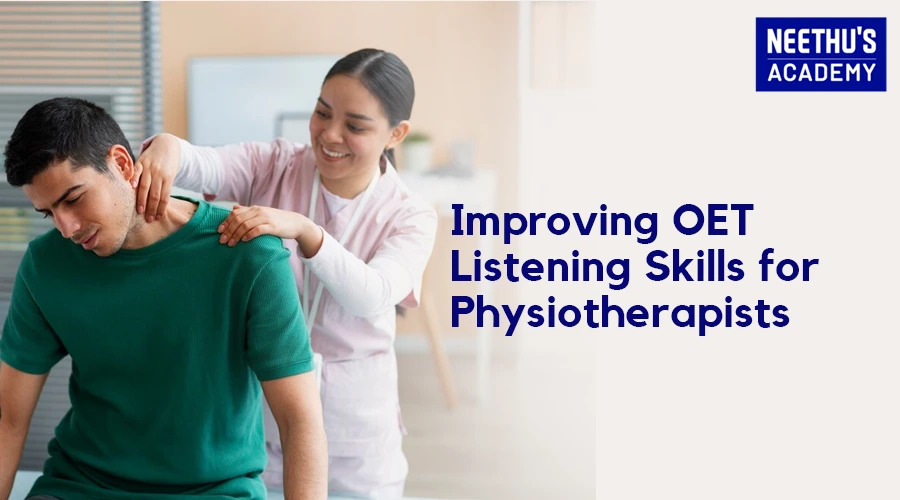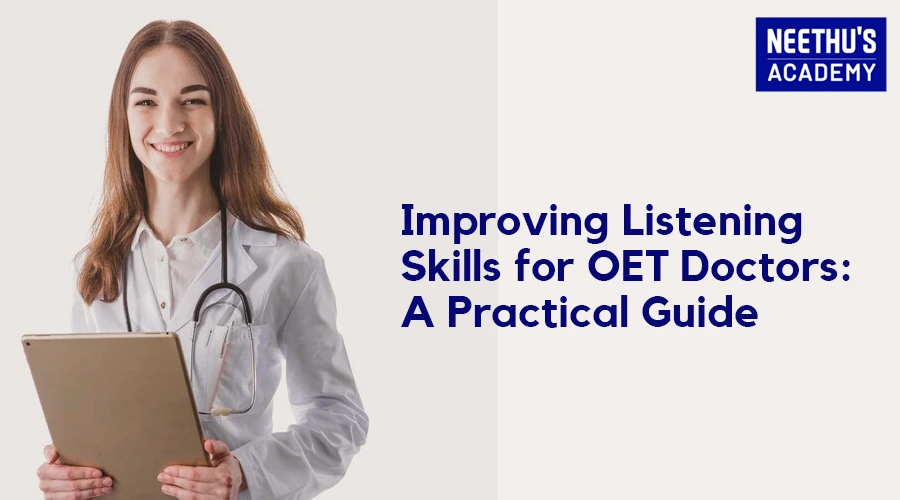From Beginner to Pro: 30-Day Guide to Mastering OET Listening Skills
Mastering the OET Listening sub-test is very necessary for healthcare workers eyeing job opportunities in an English-speaking country. The OET Listening test has you assessing your listening ability as applied in real clinical settings, to find out if you are indeed listening for vital information on medicine. Professionals in the health sector may face serious difficulty in this section because of unfamiliar accents, complicated terms, and other speaking patterns. You can develop your OET listening skills very fast by steady practice.
The purpose of the listening section is to see how well you will be able to understand patient and healthcare provider communications accurately, thereby capturing the essentials in different health-related situations. Here, you will be given a structured 30-day plan, practical strategies, and the best resources to practice OET listening skills, which will enable you to boost your skills and enhance your score in OET listening.
Understanding the OET Listening Sub-Test
The OET Listening sub-test is divided into three parts aimed at testing your listening skills in real healthcare situations:
Part A (Consultation Extracts): You listen to two patient consultations and fill in missing details on the go, paying attention to the minimum facts shared.
Part B (Short Workplace Extracts): This section contains six audio recordings. Each recording reflects a very common, everyday occurrence of interaction between health professionals as part of their job. You will answer one multiple-choice question based on each of the recordings.
Part C (Presentation Extracts): This section allows for two extended recordings, a presentation or interview, on the topic of health care and then multiple-choice questions are presented for the questions on the recording.
Each of the sections has a different structure, so your perception of every part’s need will encourage you to practice accordingly to become better prepared and accomplished.
30-Day Improvement Plan for OET Listening Skills
It can help provide 30 days of a structured improvement plan so that one gains the essential listening skills, builds confidence, and enables them to practice regularly. There will always be something to focus on with listening each week from a basic understanding and taking it to complexity.
Day 1-7: You will receive your foundation
Familiarize yourself with the test format.
Start by allocating time to go through every section of the OET Listening test. Provide yourself with enough time to know what kind of questions are in the test, what sequence the test will take, and what you can expect for each response. The higher your knowledge is of the format of the test, the lower the shock factor becomes, and you will stay cool and confident.
Daily Habit in Listening
Spend at least 20-30 minutes a day practicing active listening. You can begin with general sources of audio in English, such as news or podcasts. Your focus will strengthen in this setting because your overall understanding is improved before focused medical-specific listening exercises.
Day 8-14 Medical terminology and accents
Medical Vocabularies and Words
Medical terminologies are a very basic part of the OET Listening test. This week, prepare a list of common medical terms, phrases, and abbreviations that you encounter frequently in your readings. For this, you may rely on sources such as journals about medicine, health podcasts, vocabulary apps, and so on.
Practice Understanding the Accents of Other Speakers
Familiarize yourself with British, American, and Australian accents so that you don’t miss important details. Try to listen to podcasts, news channels, and YouTube videos in the voice of the voices mentioned, containing healthcare content. If some sounds or pronunciations seem difficult, keep repeating them in your mouth so that you have built confidence and familiarity over time.
Day 15-21: Listen and Practice with Live Audio
Timed Listening Practice
Test can be better simulated through audio time segments. Focus on what the question wants and also on answering questions in a given time. Simulate the test atmosphere again by sitting in a quiet environment and having a timer so that one focuses while familiarizing with the atmosphere.
Mock tests and self-assessment
Take long practice tests as comprehensive progress reviews. Go through the answers for each test carefully and identify your improvement areas. Also, keep a record of questions commonly attempted wrong to use as targets for further study with a comment on whether there are any specific accents or terminology causing repeat errors.
Day 22-30: Keep Refining those Techniques
Techniques for Effective Listening to Succeed
Use advanced listening techniques, such as:
Predicting answers: Sit through the audio before it actually starts and glance through questions in order to be able to predict possible answers. This keeps you focused on particular information.
listening for context clues: you hear the words around the unknown terms or the overall tone of the conversation to make sense of them.
Visualization: Picture it all in your mind as you listen to each section. This keeps it in your memory and creates associations that are beneficial for remembering.
Tips for Continuous Improvement
Apply Context Clues
This is the art of using context clues that can come in handy while listening for comprehension. For instance, there will be an unknown word, but due to surrounding words or tone of voice from the speaker, one may know what it means.
Improve Concentration
Listening can be mentally taxing, especially in the testing environment. Enhance your concentration with short, focused exercises. Listen to a health-related podcast without taking notes, and summarize what you remember to improve retention and focus.
Listen Actively Daily
Active listening is the ability to pay absolute attention to the audio and has no distractions around him. During daily practice, completely focus only on the speaker, inhibiting any external thoughts or distractions. This will make you sharply focus and be able to note important details in the exam.
Recommended Resources for OET Listening Practice
OET Official Practice Tests
Official practice tests are closest to the actual test as these consist of realistic question types that will give you real-life experience in terms of test pacing and format. Make it a part of your weekly study plan.
Best Listening Apps and Websites
Other listening applications and websites that can help enhance your listening skills are:
BBC Sounds: Content with British English on health-related topics.
Spotify and Audible: Medical podcasts, healthcare lectures, and health-focused audiobooks expose listeners to various expressions and terms.
TED Talks and NHS Health Talk: Listening to discussions on health issues and innovations will help build comprehension as well as vocabulary.
Help from OET Online Coaching
While self-study is effective, professional coaching can accelerate your progress. Joining the best OET coaching center in Kerala or using online OET coaching services would provide access to expert guidance, structured practice materials, and personalized feedback to a candidate. Most coaching centers now offer specialized courses on the exclusive demands of the OET Listening sub-test. Such courses can prove to be quite useful for candidates close to the test date as well.
Conclusion
Improving your OET Listening skills in 30 days is totally achievable if you plan it appropriately. Focus on improving yourself in a structured manner, memorize medical terms, and practice authentic material so that your listening improves and you get the desired score. Incorporating such lifelong learning habits like daily listening practice and active engagement can facilitate long-term improvements in listening. With commitment and the right strategies, you will certainly prepare to be successful in an OET Listening test.
Frequently Asked Questions





